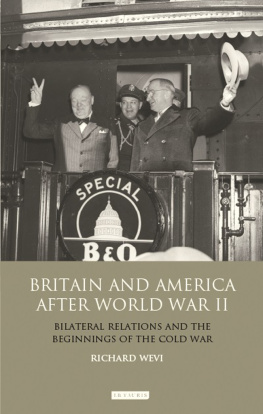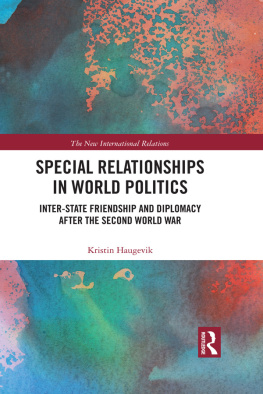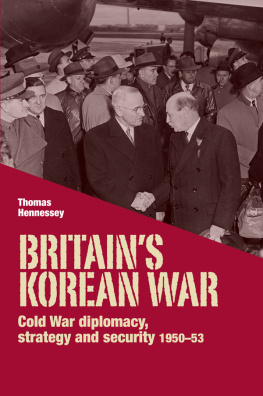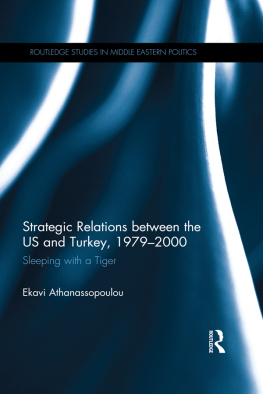Richard Wevill turned to the study of history after a successful career in investment banking. Richard gained an MA in War and Society and his PhD from the University of Exeter where he was recently appointed a Research Fellow. Richard is currently working on the authorised biography of Roger Makins who was the British Ambassador in Washington from 1952 to 1956.
BRITAIN AND AMERICA AFTER WORLD WAR II
Bilateral Relations and the Beginnings of the Cold War
RICHARD WEVILL
Published in 2012 by I.B.Tauris & Co Ltd
6 Salem Road, London W2 4BU
175 Fifth Avenue, New York NY 10010
www.ibtauris.com
Distributed in the United States and Canada
Exclusively by Palgrave Macmillan
175 Fifth Avenue, New York NY 10010
Copyright 2012 Richard Wevill
The right of Richard Wevill to be identified as the author of this work has been asserted by the author in accordance with the Copyright, Designs and Patent Act 1988.
All rights reserved. Except for brief quotations in a review, this book, or any part thereof, may not be reproduced, stored in or introduced into a retrieval system, or transmitted, in any form or by any means, electronic, mechanical, photocopying, recording or otherwise, without the prior written permission of the publisher.
International Library of Twentieth Century History, Vol. 46
ISBN 978 1 84885 980 7
A full CIP record for this book is available from the British Library
A full CIP record for this book is available from the Library of Congress
Library of Congress catalog card: available
Typeset by Newgen Publishers, Chennai
Printed and bound by CPI Group (UK) Ltd, Croydon, CR0 4YY
For Lin, Emma, Carla, Amy and Freddie
CONTENTS
ACKNOWLEDGEMENTS
In writing this book I have acquired debts to many people. Their mention here is only a small part of my gratitude. My primary debt is to Professor Andrew Thorpe. The quality of his advice and the counsel he offered can only come from years of experience of teaching, combined with a mastery of his subject. I am also grateful to Dr Richard Toye whose advice do not be afraid to write about the apparently trivial proved invaluable. I also owe a debt to other members of the Department of History at the University of Exeter. These include Dr Joseph Smith, who inspired my interest in Anglo-American diplomacy, and Professor Jeremy Black, who was encouraging and helpful whilst I was a student at Exeter.
Almost without exception the staff at the various archives I have visited have proved to be both professional and helpful. Their assistance has made the task considerably easier than it might otherwise have been. I am particularly indebted to the George C. Marshall Foundation not only for awarding me a Marshall Fellowship but also because of the welcome and assistance they offered me whilst I was in Virginia. The enthusiasm and kindness of Paul Barron and Joanne Hartog was exceptional.
I am also grateful to Lin who patiently and diligently read several early drafts. There is no question that as a result of her efforts this book reads better than it otherwise would have. Finally, I would like to thank Freddie who has been a constant companion throughout the writing of this book.
INTRODUCTION
The call for diplomacy in the aftermath of World War II was considerable. The world had been broken, and putting it back together again was a difficult task. The relationships between nations were in a state of flux, and politicians and diplomats laboured to impose an order upon them whilst at the same time seeking to preserve national advantage. The conduct of international relations was an essential part of the post-war agenda for nearly all governments. Of particular importance for Britain were its relations with America. These relations fell into three categories. First, there were those which were related to the United Nations and other multinational agencies. These included, for example, the international control of atomic energy, multilateral trade talks and the international aspect of civil aviation. Second, there were relations of a quadrilateral or trilateral character concerned in the main with occupation matters and the peace treaties. These included discussions regarding the occupation of Germany and Japan and the meetings of the Council of Foreign Ministers. Finally, there were relations of a bilateral character. This book is concerned with this last category.
The period 1945 to 1948 was a crucial one in post-war history. It was the period which formed the link between World War II and the Cold War. As World War II ended, there was still an element of cordiality between the Allies who had fought the war together. By 1948, with the implementation of the Marshall Plan, there was, however, a clear division between the Western powers and the Soviets. It was a short step from the Marshall Plan to signing the North Atlantic Treaty in April 1949 and the subsequent establishment of North Atlantic Treaty Organisation (NATO). At the same time, as this broad movement was taking place, there was also a reassessment of Anglo-American relations. Britain had been remarkably close to America during World War II. There had been a complete unification of military effort, a sharing of intelligence and weaponry, all underpinned by the vast transfer of resources from America to Britain in the form of Lend Lease and the presence in Washington of over 9,000 British officials. Notwithstanding this, Britain was deeply disappointed by the American response to a number of issues in the immediate post-war period; these included the terms of the Financial Agreement signed in December 1945 whereby the United States extended a line of credit of $3.75 billion to the United Kingdom, the failure to continue collaboration in the atomic energy field and the American response to Britains problems in Palestine. By early 1947, however, there was a perceptible change in the American approach. America, more aware of Britain and Europes weaknesses and galvanised by the truculent behaviour of the Soviets, became more supportive of Anglo-American relations. This change led to the Modus Vivendi and Pentagon talks, which, in turn, cleared the way for the legislature to approve the Marshall Plan. This book considers these bilateral events and pays particular attention to the role, and therefore the influence, that the British ambassadors and other members of the British embassy in Washington had upon them.
The activities of Britains Washington embassy are considered in the context of a number of significant events. The first challenge the embassy faced in the post-war period was the negotiation of the Financial Agreement. The book begins with a consideration of the embassys role in the pre-negotiation period; that is from early 1945 onwards. It ends with a consideration of the part the embassy played in the Marshall Plan proposals. By the time the US Congress approved the Marshall Plan and passed the Economic Cooperation Act in April 1948, there had been a fundamental shift in international relations.
The period saw one of the most important changes in international politics that took place during the twentieth century Americas clear confirmation in the post-war period of its earlier shift away from isolationism. It is interesting to consider the voting in Congress on some of the key foreign policy issues during this period. The Financial Agreement (1946) passed through the House of Representatives by votes to 155. Aid to Greece and Turkey after the British withdrawal (1947) passed by 287 votes to 107. The Marshall Plan (1947) passed by 318 votes to 75. The trend in the Senate was no less clear. The Financial Agreement passed by 46 votes to 34, aid to Greece and Turkey by 67 votes to 23 and the Marshall Plan was passed with general acclamation without the need for a vote.






